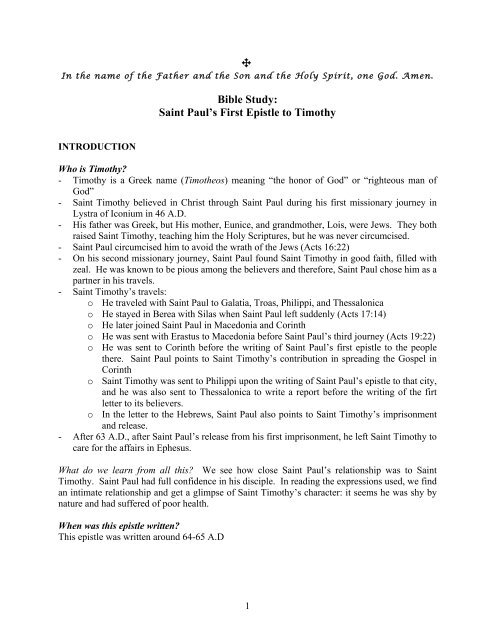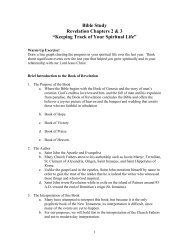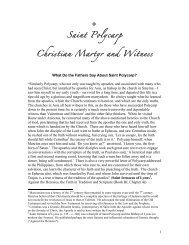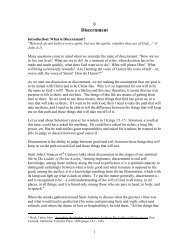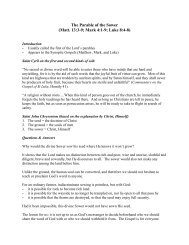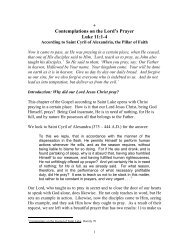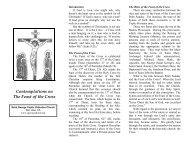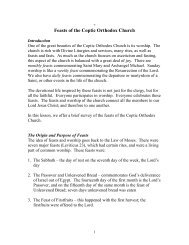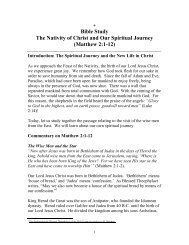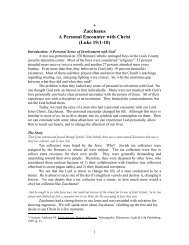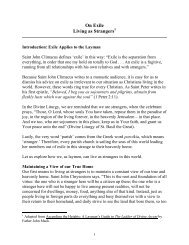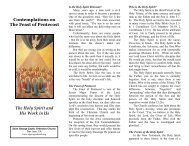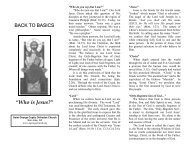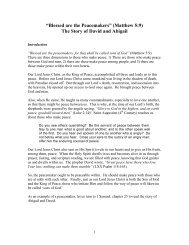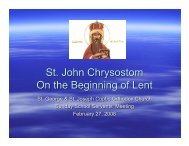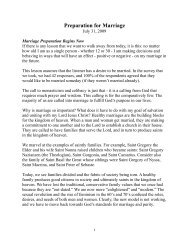1 Timothy - Bible Study and Notes - Saint George & Saint Joseph ...
1 Timothy - Bible Study and Notes - Saint George & Saint Joseph ...
1 Timothy - Bible Study and Notes - Saint George & Saint Joseph ...
You also want an ePaper? Increase the reach of your titles
YUMPU automatically turns print PDFs into web optimized ePapers that Google loves.
&<br />
In the name of the Father <strong>and</strong> the Son <strong>and</strong> the Holy Spirit, one God. Amen.<br />
INTRODUCTION<br />
<strong>Bible</strong> <strong>Study</strong>:<br />
<strong>Saint</strong> Paul’s First Epistle to <strong>Timothy</strong><br />
Who is <strong>Timothy</strong>?<br />
- <strong>Timothy</strong> is a Greek name (Timotheos) meaning “the honor of God” or “righteous man of<br />
God”<br />
- <strong>Saint</strong> <strong>Timothy</strong> believed in Christ through <strong>Saint</strong> Paul during his first missionary journey in<br />
Lystra of Iconium in 46 A.D.<br />
- His father was Greek, but His mother, Eunice, <strong>and</strong> gr<strong>and</strong>mother, Lois, were Jews. They both<br />
raised <strong>Saint</strong> <strong>Timothy</strong>, teaching him the Holy Scriptures, but he was never circumcised.<br />
- <strong>Saint</strong> Paul circumcised him to avoid the wrath of the Jews (Acts 16:22)<br />
- On his second missionary journey, <strong>Saint</strong> Paul found <strong>Saint</strong> <strong>Timothy</strong> in good faith, filled with<br />
zeal. He was known to be pious among the believers <strong>and</strong> therefore, <strong>Saint</strong> Paul chose him as a<br />
partner in his travels.<br />
- <strong>Saint</strong> <strong>Timothy</strong>’s travels:<br />
o He traveled with <strong>Saint</strong> Paul to Galatia, Troas, Philippi, <strong>and</strong> Thessalonica<br />
o He stayed in Berea with Silas when <strong>Saint</strong> Paul left suddenly (Acts 17:14)<br />
o He later joined <strong>Saint</strong> Paul in Macedonia <strong>and</strong> Corinth<br />
o He was sent with Erastus to Macedonia before <strong>Saint</strong> Paul’s third journey (Acts 19:22)<br />
o He was sent to Corinth before the writing of <strong>Saint</strong> Paul’s first epistle to the people<br />
there. <strong>Saint</strong> Paul points to <strong>Saint</strong> <strong>Timothy</strong>’s contribution in spreading the Gospel in<br />
Corinth<br />
o <strong>Saint</strong> <strong>Timothy</strong> was sent to Philippi upon the writing of <strong>Saint</strong> Paul’s epistle to that city,<br />
<strong>and</strong> he was also sent to Thessalonica to write a report before the writing of the firt<br />
letter to its believers.<br />
o In the letter to the Hebrews, <strong>Saint</strong> Paul also points to <strong>Saint</strong> <strong>Timothy</strong>’s imprisonment<br />
<strong>and</strong> release.<br />
- After 63 A.D., after <strong>Saint</strong> Paul’s release from his first imprisonment, he left <strong>Saint</strong> <strong>Timothy</strong> to<br />
care for the affairs in Ephesus.<br />
What do we learn from all this? We see how close <strong>Saint</strong> Paul’s relationship was to <strong>Saint</strong><br />
<strong>Timothy</strong>. <strong>Saint</strong> Paul had full confidence in his disciple. In reading the expressions used, we find<br />
an intimate relationship <strong>and</strong> get a glimpse of <strong>Saint</strong> <strong>Timothy</strong>’s character: it seems he was shy by<br />
nature <strong>and</strong> had suffered of poor health.<br />
When was this epistle written?<br />
This epistle was written around 64-65 A.D<br />
1
What is the purpose of this epistle to <strong>Saint</strong> <strong>Timothy</strong>?<br />
- This is a Pastoral Letter. While most of <strong>Saint</strong> Paul’s epistles are directed to a church in a<br />
particular location, the pastoral letters are written to instruct specific leaders.<br />
- <strong>Saint</strong> Paul wrote this letter to <strong>Timothy</strong> to clarify his pastoral commitments in Ephesus.<br />
- <strong>Saint</strong> Paul advises <strong>Saint</strong> <strong>Timothy</strong> who is dealing with church members who are promoting a<br />
variety of theological opinions – from the irrelevant to the heretical<br />
- There are also external pressures on the Church:<br />
o Hellenistic mystery religions who misused the terms “salvation” <strong>and</strong> “savior”<br />
o Cult of emperor worship, according to which Caesar is “lord.”<br />
- <strong>Saint</strong> Paul opposes false doctrine with apostolic doctrine<br />
- The Church is guided by the Holy Spirit<br />
- The Church’s government is Pastoral<br />
Theme of this Epistle: The Pastoral Care of the Faithful<br />
- The role of the Church is to manifest the Kingdom of God on earth – “Heaven on Earth”<br />
- How is this done? The Church’s function integrally connects both apostolic<br />
doctrine/teachings <strong>and</strong> worship.<br />
- Other themes of this epistle include: (1) the role of the clergy, (2) combating heresy, (3) care<br />
for women, widows, <strong>and</strong> slaves, <strong>and</strong> (4) money <strong>and</strong> the ministry<br />
This is a particularly attractive epistle to the youth. <strong>Timothy</strong> was a young minister, himself.<br />
Also, we will be called to lead in some capacity; whether in church, at work, at school, or in our<br />
own homes. This epistle teaches us the characteristics of a strong leader in Christ.<br />
2
CHAPTER 1<br />
Greeting (v. 1-2)<br />
1. Encouraging words to a young minister<br />
a. <strong>Timothy</strong> is a servant committed to preaching <strong>and</strong> witness in spite of hardships <strong>and</strong><br />
difficulties, not only within the Ephesian church, but also those that come from the<br />
pagan world.<br />
b. As <strong>Saint</strong> Paul is an apostle of Jesus Christ by the comm<strong>and</strong>ment of God, he also<br />
wishes to remind <strong>Timothy</strong> that his call is also from God.<br />
c. <strong>Saint</strong> John Chrysostom says that from the beginning, <strong>Saint</strong> Paul elevates <strong>Timothy</strong>’s<br />
spirit <strong>and</strong> encourages him by saying that God is our Savior <strong>and</strong> Christ is our hope.<br />
d. Question: What other attributes of God can we remember that will help us in our time<br />
of trouble? How can we encourage others who are also in the midst of trials <strong>and</strong><br />
tribulation?<br />
e. <strong>Saint</strong> Paul repeats the phrase “our Savior” in the Pastoral Epistles more than all the<br />
other epistles. Question: Why does he do this? How does the importance of “savior”<br />
relate to the goal of the ministry?<br />
f. <strong>Saint</strong> Paul calls <strong>Timothy</strong> “a true son” (gensios – the original, true, genuine, or real<br />
son). <strong>Saint</strong> Paul is <strong>Timothy</strong>’s spiritual father. This fatherhood reflects the heavenly<br />
Fatherhood of God. The Church reflects heaven on earth. The Church is a new<br />
family in faith. What happens when we are at a crossroads between choosing the<br />
new family <strong>and</strong> Fatherhood <strong>and</strong> severing ties with our natural family? Do these<br />
words of <strong>Saint</strong> Paul encourage you?<br />
g. Mercy. The typical Pauline greeting, “grace <strong>and</strong> peace,” is now exp<strong>and</strong>ed to include<br />
“mercy.” In Greek, the word is eleos; in Hebrew hesed. The excellent book<br />
Orthodox Worship describes the meaning of the word mercy as follows:<br />
i. The word mercy in English is the translation of the Greek word eleos. This<br />
word has the same ultimate root as the old Greek word for oil, or more<br />
precisely, olive oil; a substance which was used extensively as a soothing<br />
agent for bruises <strong>and</strong> minor wounds. The oil was poured onto the wound <strong>and</strong><br />
gently massaged in, thus soothing, comforting <strong>and</strong> making whole the injured<br />
part. The Hebrew word which is also translated as eleos <strong>and</strong> mercy is hesed,<br />
<strong>and</strong> means steadfast love. The Greek words for "Lord, have mercy", are<br />
"Kyrie Eleison" - that is to say, "Lord, soothe me, comfort me, take away my<br />
pain, show me your steadfast love." Thus mercy does not refer so much to<br />
justice or acquittal - a very Western interpretation - but to the infinite lovingkindness<br />
of God, <strong>and</strong> his compassion for his suffering children! It is in this<br />
sense that we pray "Lord, have mercy," with great frequency throughout the<br />
Divine Liturgy.<br />
ii. Why does <strong>Saint</strong> Paul include “mercy” when addressing <strong>Timothy</strong>? Ministers<br />
need mercy for than anyone else. We need to come closer to God. We need<br />
to realize the steadfastness of God’s love in order to be patient with others <strong>and</strong><br />
offer them the same love <strong>and</strong> mercy.<br />
iii. Related to mercy, <strong>Saint</strong> Paul also calls our Lord Jesus Christ, our hope. We<br />
struggle now in hope to enjoy victory over death <strong>and</strong> attain eternal life; <strong>and</strong> in<br />
3
Him we enter into the bosom of our Heavenly Father in order to live <strong>and</strong> to be<br />
glorified with Him.<br />
Opposing Speculations with Faith (v. 3-4)<br />
1. What did <strong>Saint</strong> Paul instruct <strong>Timothy</strong> to do?<br />
a. Stay in Ephesus<br />
i. <strong>Timothy</strong> is the first one called to oversee the church in Ephesus; the first<br />
bishop.<br />
ii. <strong>Saint</strong> Paul urges or “pleads anxiously.” He does not comm<strong>and</strong> as a master to<br />
his slave, but urges <strong>and</strong> pleads in humility. What does this teach us about<br />
leadership in the Church?<br />
b. To instruct some Ephesians not to teach unorthodox doctrines<br />
i. There were those within the Church who were altering the Christian doctrine,<br />
<strong>and</strong> <strong>Timothy</strong> is called to fix both the ministers <strong>and</strong> the people of the Church.<br />
ii. The people ought to cleave to the doctrine as it was delivered to them. This is<br />
the responsibility of all to preserve the correct Christian doctrine.<br />
iii. Why is maintaining our Orthodox Faith so important? What is at the heart of<br />
the Christian doctrine that is so important for us to preserve? How do we<br />
carry out this responsibility?<br />
c. To instruct them not to give heed to fables<br />
i. Maybe <strong>Saint</strong> Paul referred to Jewish fables, as he told Titus (1:14) –<br />
inventions, forgeries, counterfeit doctrines (Chrysostom).<br />
ii. What about the pagan fables of the Greek, Roman, <strong>and</strong> Persian cultures?<br />
These cultures had myths or stories about the descent of some gods to marry<br />
daughters of the people of this world.<br />
iii. Any modern day fables that we should be aware of today?<br />
d. …<strong>and</strong> endless genealogies – what are these?<br />
i. These cause disputes rather than godly edification which is in faith. So what<br />
are these genealogies? A few possible explanations:<br />
1. Jewish genealogies – there were Jews who had come into Christianity<br />
who were still boasting about their lineage or their ancestors, so they<br />
stumbled on into the trap of pride <strong>and</strong> vainglory.<br />
2. Greek genealogies – these also gave great importance; tracing their<br />
deities through certain genealogies.<br />
3. Referring to the Gnostic heresy; the Supreme Being had produced<br />
offspring. They believed they could attain the Supreme Being through<br />
knowledge as they passed through these ‘Aeons’, the series of<br />
offspring that came into being<br />
ii. “Endless” – tiresome <strong>and</strong> purposeless<br />
iii. These are not done in love, but in arrogance. They do not build up the<br />
Church, but break it down .<br />
e. Question: There were controversies in the early Church. We may face arguments <strong>and</strong><br />
controversies in our own Church. How do we deal with problems that arise?<br />
4
2. The Purpose of the Comm<strong>and</strong>ment – What are the elements of this verse?<br />
a. Love<br />
i. Without love (love of God, <strong>and</strong> love for each other), we deviate from our<br />
mission. Then we turn to fruitless controversies <strong>and</strong> cause divisions in the<br />
church community.<br />
ii. This is our task as ministers – connecting faith <strong>and</strong> life in love<br />
iii. “by their fruits you shall know them” (Matthew 7:16)<br />
b. From a Pure Heart<br />
i. The heart must be cleansed from all sinful love<br />
c. From a Good Conscience<br />
i. A real belief of the truth of the word of God<br />
d. From a Sincere Faith<br />
i. “Faith unfeigned” – genuine <strong>and</strong> sincere<br />
e. What are examples of false love? What are examples of true love?<br />
i. <strong>Saint</strong> Augustine says, “We can never love others truly unless we love the<br />
Lord. Each one who loves his neighbor as himself loves God, but if he does<br />
not love God, then he even does not love himself.”<br />
ii. <strong>Saint</strong> John Chrysostom says, “But about what kind of love is the apostle<br />
speaking? It is sincere love that is not based on mere words but that stems<br />
from the inner inclination <strong>and</strong> emotions of a being, for the apostle states:<br />
“from a pure heart.” An evil life creates divisions since: “For everyone<br />
practicing evil hates the light” (John 3:20). It is true that there are friendships<br />
even among the wicked, for criminals <strong>and</strong> thieves love each other. Yet this<br />
love does not spring from a pure heart or a good conscience, but rather from a<br />
profane heart <strong>and</strong> not out of sincere faith, but from a false <strong>and</strong> hypocritical<br />
one…for faith indicates truth…<strong>and</strong> whoever truly believes in God cannot<br />
keep away from Him.”<br />
iii. Loving God means believing in Him, rather than believing things about Him.<br />
Opposing Legalism with Grace (v. 6-11)<br />
1. To what did some turn astray <strong>and</strong> why did they do so?<br />
a. They turned astray to idle talk<br />
i. Those who turn away from the true, Divine love mentioned in verse 5, are left<br />
with emptiness<br />
ii. Instead of filling that emptiness with God’s love, they turn to idle talk –<br />
corrupt conversations, aimless controversies, an unrighteous life, devoid of<br />
underst<strong>and</strong>ing what is his purpose in life.<br />
iii. What kinds of activities do people turn to today to fill the emptiness left behind<br />
because they lack God’s love?<br />
b. Desiring to be teachers of the Law, underst<strong>and</strong>ing neither what they say nor the things<br />
which they affirm (v. 7)<br />
i. One reason for evil is the desire for authority<br />
ii. These look for dignity, yet they disregard the truth<br />
iii. The apostle blames these for they do not know the real aim of the law<br />
5
iv. They covered their weakness by claiming to be teachers <strong>and</strong> defenders of the<br />
Law. Their activities were not concerned with bringing themselves <strong>and</strong> others<br />
to the Truth, with a capital ‘T’, but they wanted to satisfy their selfish love of<br />
authority <strong>and</strong> supremacy.<br />
c. The Law is not bad in <strong>and</strong> of itself, so long as one uses it lawfully (v. 8)<br />
i. The fault is not in the law but in its abuse<br />
ii. The Jews at this time had stressed the letter of the law without realizing its<br />
purpose.<br />
iii. The Law point to Christ at its heart.<br />
d. Who is the law for <strong>and</strong> what does this all mean?<br />
i. The law is for the following:<br />
1. the lawless <strong>and</strong> insubordinate - disobedient/rebellious – breaking the<br />
comm<strong>and</strong>ments intentionally <strong>and</strong> not out of weakness<br />
2. for the ungodly <strong>and</strong> for sinners – those who commit sin boldly,<br />
without shame<br />
3. for the unholy <strong>and</strong> profane – those who convinced easily to sin without<br />
suffering from a guilty conscience<br />
4. for murderers of fathers <strong>and</strong> murderers of mothers, for manslayers –<br />
those with the cruelest hearts, behaving as savages<br />
5. for fornicators, for sodomites – adultery, impurity, performing that<br />
which is contrary to nature<br />
6. for kidnappers – those who steal men to sell them as slaves<br />
7. for liars, for perjurers – the worst liars<br />
8. <strong>and</strong> if there is any other thing that is contrary to sound doctrine – those<br />
who not only commit evil but resist the truth<br />
ii. Once we enjoy a life with Christ <strong>and</strong> know that He dwells in us by His Holy<br />
Spirit, guiding our lives, <strong>and</strong> filling us, then there is no need to return again<br />
<strong>and</strong> fall under the rulings of the Law.<br />
1. <strong>Saint</strong> John Chrysostom uses the following analogies:<br />
a. The horsemen, at the beginning, uses reins to control the horse,<br />
but once the horse is controlled, there is no need for the reins<br />
b. Children learn the alphabet, but once they learn to read, there is<br />
no need to go back to the alphabet<br />
2. This is the proper use of the Law. Once it has achieved its purpose by<br />
leading us to the Lord, we rise above it <strong>and</strong> do not remain under it any<br />
longer.<br />
3. <strong>Saint</strong> John Chrysostom says, “If someone fulfills the law through his<br />
behavior, then he is using the law properly <strong>and</strong> for his own benefit.<br />
iii. Why does <strong>Saint</strong> Paul instruct <strong>Timothy</strong> as such? The subject of his preaching<br />
is the comm<strong>and</strong>ment whose end is love<br />
1. It is love that opens our hearts<br />
2. The law is presented to the worst <strong>and</strong> most profane of men to bring<br />
them into the glory of God’s message <strong>and</strong> his love<br />
3. He wants these people to feel the need for a Savior<br />
iv. Let’s bring this all together into two examples:<br />
6
1. As Orthodox Christians, we have a lot to take pride in – that we are a<br />
church connected to the early Church, founded on the apostles, with a<br />
rich history, etc. But who is at the heart of Orthodox Christianity? Do<br />
we forget that Christ is holding it all together <strong>and</strong> that Orthodoxy leads<br />
us into a personal, loving relationship with our Lord?!<br />
2. As we begin our spiritual life, we need the comm<strong>and</strong>ments to guide us.<br />
At first it is a matter of doing certain things, <strong>and</strong> then not doing other<br />
things. But in the end, breaking bad habits <strong>and</strong> developing good ones,<br />
all leads us to the Lord. Then there is no need to be consciously aware<br />
of the Law, because, so long as the Lord dwells in us <strong>and</strong> we are in<br />
communion with Him, we will live the Law naturally <strong>and</strong> be free in<br />
the spirit.<br />
Paul’s Example: Salvation by Grace (v. 12-17)<br />
1. Into what did God put <strong>Saint</strong> Paul?<br />
a. Into the ministry<br />
b. As we said, the comm<strong>and</strong>ment’s end is love.<br />
c. It is this kind of love that enables pastors to care for the wicked, the criminals, the<br />
insubordinate, <strong>and</strong> all those mentioned in verses 9-10.<br />
d. This commitment to the ministry is not a gift from a pastor to his people, but rather<br />
payment of a debt; the minister loves God by loving others.<br />
2. <strong>Saint</strong> Paul: A Persecutor (v. 13)<br />
a. What was <strong>Saint</strong> Paul before he became a Christian?<br />
i. A blasphemer, a persecutor, an insolent man (rude, disrespectful, arrogant)<br />
b. <strong>Saint</strong> Paul shows the practicality of God’s love by drawing on his own experience.<br />
c. <strong>Saint</strong> Paul was a great persecutor of the Christians. We see how God loved him<br />
much, for He rescued him from death <strong>and</strong> raised him to be a faithful servant of the<br />
Truth.<br />
d. <strong>Saint</strong> Paul never said he was worthy of this love, but he obtained mercy; God showed<br />
His grace in abundance.<br />
e. Does this mean that God’s grace somehow negates our free will? In other words,<br />
when the Lord appeared to <strong>Saint</strong> Paul on the road to Damascus, did he have a<br />
choice?<br />
f. <strong>Saint</strong> Paul is an example for us that no one should despair due to any sin, for it shall<br />
be forgiven him so long as he repents.<br />
g. Why this persecutor <strong>and</strong> not another? There were many persecutors in the early<br />
church. What was special about <strong>Saint</strong> Paul that he was chosen by God?<br />
i. The Pharisees <strong>and</strong> Sadducees <strong>and</strong> the time of Christ did not resist Him out of<br />
ignorance but according to their free will <strong>and</strong> with total knowledge. <strong>Saint</strong><br />
John the Evangelist writes in the Gospel, “Nevertheless even among the rulers<br />
many believed in Him, but because of the Pharisees they did not confess Him,<br />
lest they should be put out of the synagogue; for they loved the praise of men<br />
more than the praise of God” (John 12:42-43).<br />
ii. The leaders always loved authority.<br />
7
iii. Where was <strong>Saint</strong> Paul in all of this? He was sitting at the feet of Gamaliel,<br />
learning from him, <strong>and</strong> did not have a share with those who opposed Christ.<br />
iv. So how did <strong>Saint</strong> Paul come to resist the Christians later?<br />
1. He saw that Christianity was growing <strong>and</strong> that many disciples were<br />
following Christ<br />
2. <strong>Saint</strong> Paul persecuted them out of jealousy, in a sense, <strong>and</strong> not for the<br />
love of authority<br />
3. He thought Christianity was harmful, <strong>and</strong> he feared that it would<br />
become widespread.<br />
4. God’s mercy rescued him <strong>and</strong> he was enlightened to the truth<br />
v. What lesson does this all teach us about our brothers <strong>and</strong> sisters who are far<br />
from the Lord?<br />
1. Therefore, let us be patient with our brothers <strong>and</strong> sisters who are far<br />
from the Lord; or who make mistakes. We do not know their motives<br />
for resisting. We do not know the full story, so to speak. So we ought<br />
to penetrate their hearts with God’s love. Let us show them that they<br />
have a Savior who can give them hope. We will love God by loving<br />
others.<br />
3. “…to save sinners, of whom I am chief”<br />
a. In light of the way the world treats sin today, <strong>Saint</strong> Paul’s honesty <strong>and</strong> humility is<br />
remarkable.<br />
b. We are all sensitive to sin. We do not like to be called sinners by others. If someone<br />
calls us a liar, we take great offense.<br />
c. Story: There was a man once who was so proud of his accomplishments that he<br />
decided to look into his family tree to discover the reason for his greatness. He<br />
stumbled upon some very disgraceful information concerning a certain Uncle Josh,<br />
who had been in prison <strong>and</strong> had been electrocuted. But he was so sensitive about it<br />
that when he wrote the account in his family archives, he glossed over it with fancy<br />
language: “Uncle Josh occupied the chair of applied electricity in one of our leading<br />
government institutions. He was attached to this position by the strongest of ties; <strong>and</strong><br />
his death came as a great shock.<br />
d. We’re living in a society that considers itself “sinless”, but are we really free from<br />
guilt? Modern man is no longer concerned with sin, but he pushes it under the rug.<br />
Now he is worried about the consequences of sin: guilt, despair, <strong>and</strong> low-esteem. But<br />
as long as sin remains under the rug; as long as it is not brought to God in humble <strong>and</strong><br />
tearful repentance, the consequences of sin will continue to make life miserable for<br />
man.<br />
e. The problem today is that we have lost our sense of sin. Why have we lost our sense<br />
of sin <strong>and</strong> what are some examples of ways that society has done this? Perhaps we<br />
have drawn far from God. <strong>Saint</strong> Antony the Great said, “A time is coming when men<br />
will go mad, <strong>and</strong> when they see someone who is not mad, they will attack him saying,<br />
“You are mad, you are not like us.” I believe we are living in those times.<br />
f. <strong>Saint</strong> Paul had such a great awareness of his sin. He calls himself the chief among<br />
sinners. How did he get such awareness? The closer he drew to God, the more<br />
aware he became of his sinfulness.<br />
8
i. The saints who drew close to God realized their weakness <strong>and</strong> did everything<br />
to avoid sin in order to live with God.<br />
ii. When Isaiah felt the very presence of God sitting on a throne, high <strong>and</strong> lifted<br />
up, he realized his sinfulness: “Woe is me! For I am lost, for I am a man of<br />
unclean lips, for my eyes have seen the king, the Lord of hosts.”<br />
iii. When <strong>Saint</strong> Peter had a special awareness of who the Lord Jesus was, he said:<br />
“Depart from me for I am a sinful man, O Lord.”<br />
iv. Once a young cynic said to a preacher, “You talk about the burden of sin. I<br />
feel none. How heavy is it? Fifty pounds? Ten pounds? The preacher<br />
answered, “Tell me, if you laid four hundred pounds of weight on a corpse,<br />
would it feel the load?” “No, because it is dead,” replied the youth. “So it is<br />
when one is dead to God. He doesn’t feel the weight of sin.”<br />
v. Awareness of sin is always related to our closeness to God.<br />
vi. What is Sin?<br />
1. It is not just breaking the rules<br />
2. It is separation from God<br />
3. It is separation from love; it builds a wall around us<br />
4. Sin is missing the mark (amartia); a failure of what God intended us to<br />
be; created in His image; loving Him with all our heart, mind, soul,<br />
<strong>and</strong> strength; to love our neighbors as ourselves <strong>and</strong> do good to them.<br />
5. It is self-centered rather than God centered<br />
4. Many sins – One Cure (v. 15-16)<br />
a. The confession of <strong>Saint</strong> Paul that he is the foremost among sinners does not end there.<br />
Think of all the times we sin <strong>and</strong> just leave it at that. Think of all the times we<br />
confess, but don’t follow through.<br />
b. We need to realize that in spite of our many sins, there is one cure: Christ himself.<br />
c. <strong>Saint</strong> Paul is basically saying, “If Christ could forgive me, the foremost among<br />
sinners, then He certainly can forgive anyone else”<br />
d. Sin either leads us to despair or to God. It is meant to lead us to God; to forgiveness,<br />
peace, <strong>and</strong> a new life that only he can give.<br />
e. Think of it this way: if sin is garbage, we have to remove it completely. A deodorizer<br />
won’t do. The garbage is still there. We need to leave sin behind <strong>and</strong> begin a new<br />
life with God. Our Lord Jesus Christ came into the world to save sinners; i.e. to take<br />
out the garbage.<br />
f. How do we participate in that <strong>and</strong> receive the full effect of forgiveness from sin;<br />
participate in salvation? Through the Sacramental Life of the Church: Baptism,<br />
Chrismation, the Eucharist, <strong>and</strong> Repentance/Confession.<br />
i. Baptism is death to sin <strong>and</strong> a new life in Christ (His Resurrection)<br />
ii. Chrismation gives us the Holy Spirit to guide us in the new life with our Lord;<br />
Christ within us; our personal Pentecost<br />
iii. Repentance – baptism with tears; when we are separated from God through<br />
sin, repentance leads us back<br />
iv. Eucharist – “thanksgiving” – this ‘seals the deal.’ Once we have repented, we<br />
establish union once again with God <strong>and</strong> become holy (sanctified) by<br />
9
eceiving <strong>and</strong> partaking of His Body <strong>and</strong> Blood. We develop an intimate<br />
relationship with Him.<br />
5. Glory <strong>and</strong> Honor (v. 17)<br />
a. How do we give honor <strong>and</strong> glory to God?<br />
i. By our deeds<br />
ii. By our words of praise<br />
iii. By sanctifying our body <strong>and</strong> spirit <strong>and</strong> committing our lives to the Lord,<br />
through the work of the Holy Spirit<br />
b. God was glorified in <strong>Saint</strong> Paul; <strong>Saint</strong> Paul became an example for all of us; a sinner<br />
who turned into a great servant<br />
<strong>Timothy</strong> Called to Faithfulness (v. 18-20)<br />
1. “…according to the prophecies previously made concerning you…”<br />
a. Some may have prophesied concerning <strong>Timothy</strong> at the time of his baptism or when he<br />
began to serve <strong>and</strong> commit himself to his pastoral work<br />
b. <strong>Saint</strong> Clement of Alex<strong>and</strong>ria does not say that the “prophecies” refer to <strong>Timothy</strong><br />
specifically, but rather to the general prophecies of the Old Testament<br />
i. <strong>Timothy</strong>’s ministry is the fulfillment of the specific prophecies about the<br />
spreading of the Gospel.<br />
2. “good warfare”<br />
a. It is not enough that the minister struggles, but that he fights the good fight.<br />
b. Today, we are fighting against a lot of false teachings <strong>and</strong> doctrines, so we are<br />
fighting to preserve the Truth; God’s comm<strong>and</strong>ments as they have come down to us<br />
from the Old <strong>and</strong> New Testaments<br />
c. Are there any benefits from struggle? What are they? What do we struggle against<br />
in our own spiritual life? What struggles do we encounter in our daily lives which<br />
are good, profitable, <strong>and</strong> beneficial?<br />
3. “having faith <strong>and</strong> a good conscience”<br />
a. These are two elements that we need to achieve victory in the warfare against false<br />
teachings <strong>and</strong> in our own spiritual life<br />
b. Here, <strong>Saint</strong> Paul connects the ministry with the Word with the inner life of the<br />
minister.<br />
c. <strong>Saint</strong> John Chrysostom comments on this phrase saying, “He, who wishes to be a<br />
teacher, needs to teach himself first. A person cannot become a comm<strong>and</strong>er without<br />
having been a soldier first. The same applies to a teacher too; he needs to have been a<br />
student first. In another part of his writings, the apostle says, ‘lest, when I have<br />
preached to others, I myself should be disqualified.’ He advises <strong>Timothy</strong> to have<br />
‘faith <strong>and</strong> a good conscience’ in order to be able to help others. This draws our<br />
attention to the need to follow the advice of our superiors even if we are teachers<br />
ourselves. We all do not deserve to compare ourselves with <strong>Timothy</strong>, but if he has<br />
listened to this advice <strong>and</strong> he used to learn even though he was a teacher, then does<br />
not become clear that we do need to do the same?”<br />
10
d. The result of deviating from the faith is “shipwreck”<br />
4. “Hymenaeus <strong>and</strong> Alex<strong>and</strong>er”<br />
a. Hymenaeus<br />
i. Mentioned in 2 Tim. 2:17<br />
ii. He strayed concerning the truth saying that the resurrection is already past <strong>and</strong><br />
was overthrowing the faith of some.<br />
iii. He denied the resurrection of the body on the Last Day<br />
b. Alex<strong>and</strong>er<br />
i. Probably the one mentioned in 2 Tim. 4:14<br />
ii. He did <strong>Saint</strong> Paul “much harm”<br />
c. These two men refused to obey the voice of the Lord due to their own pride<br />
d. Pride leads to “shipwreck”, <strong>and</strong> therefore, it is important for ministers to keep all<br />
humility in the sight of the Lord.<br />
e. Why were these two punished <strong>and</strong> temporarily expelled from the group?<br />
i. This excommunication is not punitive (does not serve as punishment), but it<br />
should be educative <strong>and</strong> lead to a “re-conversion.”<br />
ii. What characteristic does this demonstrate about the Church <strong>and</strong> what does<br />
this mean in our own lives?<br />
1. The Church st<strong>and</strong>s up for Truth <strong>and</strong> is not unsure of herself<br />
2. She vigorously witnesses to the gospel even at the cost of causing<br />
separations from the group<br />
3. In our own lives, we have to st<strong>and</strong> up for what is right. This is part of<br />
fighting the good fight, even if it means cutting ourselves off from<br />
others.<br />
11
CHAPTER 2<br />
Faithfulness in Prayer (2:1-7)<br />
1. The Church is an assembly (ekekleesia – ekklao – to gather; a gathering) dedicated <strong>and</strong><br />
devoted to the worship of the Lord. This chapter examines how we ought to worship; which<br />
leads us into a personal relationship with God.<br />
2. What are the elements of worship? These elements move in ascending stages.<br />
a. Supplications<br />
i. Making requests for our essential needs<br />
ii. Pleadings made in hope of receiving something<br />
b. Prayers<br />
i. Flight to God; entering into a deep <strong>and</strong> loving personal relationship with Him <strong>and</strong> for<br />
Him alone<br />
ii. Expression of worship filled with praise <strong>and</strong> offered to God, alone<br />
c. Intercessions<br />
i. Offers intercessions or requests on behalf of all men; forgetting all his needs, <strong>and</strong><br />
instead prays for the needs of others; this is an act motivated by love<br />
ii. Request for specific matters presented to God by someone who has great <strong>and</strong> unusual<br />
hope.<br />
d. Giving Thanks<br />
i. An angelic life based on uninterrupted <strong>and</strong> constant thanksgiving <strong>and</strong> praise to God<br />
3. The Church applies all these forms in her worship. This is especially true of the Liturgy.<br />
The essence of the Eucharist is a new <strong>and</strong> thankful life. We thank God for His sacrifice <strong>and</strong><br />
his offering to us of His Body <strong>and</strong> Blood, of which we partake.<br />
4. Here, <strong>Saint</strong> Paul instructs that the people of the Church pray for those in authority so that we<br />
may lead a quiet <strong>and</strong> peaceable life in all godliness <strong>and</strong> reverence<br />
a. This is our way to witness <strong>and</strong> pray for others<br />
b. This may not only be a peaceable life outwardly, but it is more important to have<br />
peace of mind, soul, <strong>and</strong> spirit<br />
5. Prayer for others is good in the sight of God<br />
a. God wants us to be saved <strong>and</strong> to come to Him<br />
b. We ought to be praying for others to do the same<br />
c. Should we pray for other nations? We should pray even more so for those<br />
idolatrous nations that they return to God. We ought to pray for all than against<br />
them!<br />
d. Prayer has the power of attracting others <strong>and</strong> gives us gentleness<br />
e. We desire that all men be saved <strong>and</strong> come to the knowledge of the truth (v. 4)<br />
f. Prayer is the lifeblood of the Church that leads us to our Lord Jesus Christ<br />
12
6. The Church is Heaven on Earth<br />
a. The Church offering general prayers for all is a reflection of our Lord Jesus<br />
Christ, the Mediator between God <strong>and</strong> men; the intercession which our Lord<br />
offers on behalf of all.<br />
b. There is no other reconciliation except through our Lord Jesus Christ.<br />
Instructions for Male Worshippers (2:8)<br />
1. Pray everywhere<br />
a. How do we reconcile this verse with the words of our Lord; when He said, “And<br />
when you pray, you shall not be like the hypocrites. For they love to pray st<strong>and</strong>ing in<br />
the synagogues <strong>and</strong> on the corners of the streets, that they may be seen by men.<br />
Assuredly, I say to you, they have their reward. But you, when you pray, go into your<br />
room, <strong>and</strong> when you have shut your door, pray to your Father who is in the secret<br />
place; <strong>and</strong> your Father who sees in secret will reward you openly” (Matthew 6:5,6).<br />
b. The Lord here warned us against boasting <strong>and</strong> pride. The Lord does not intend to<br />
confine prayer to a specific place, but makes the request to ab<strong>and</strong>on vainglory. The<br />
comm<strong>and</strong> of the Lord is against spiritual showmanship, <strong>and</strong> not against<br />
congregational prayer. Secret prayer is prayer of the heart, <strong>and</strong> therefore not<br />
inconsistent with the comm<strong>and</strong> to pray everywhere.<br />
c. <strong>Saint</strong> Paul calls for liberation from the customs of the Jews who were only permitted<br />
to draw near to God <strong>and</strong> offer their sacrifice in a specific place (Remember when we<br />
spoke of rising above the law <strong>and</strong> freedom of the spirit?)<br />
d. If <strong>Saint</strong> Paul asks the Church to pray for everyone since Christ died for all, then it<br />
only makes sense that we pray everywhere.<br />
2. Holy H<strong>and</strong>s<br />
a. This represents a holy life, sanctified (made holy) in the spirit. Prayer must be united<br />
with quiet <strong>and</strong> godly behavior.<br />
3. We ought to approach God in the spirit of repentance; to be holy as He is holy.<br />
4. When we st<strong>and</strong> to pray, we ought to be reconciled with all; being without anger. We also<br />
ought to pray with conviction <strong>and</strong> without doubt.<br />
a. Story: Once a family was ready to leave on vacation. Before they left, they prayed<br />
for good weather on their vacation. As they piled into the car, the young girl reached<br />
into the back, grabbed the umbrella, <strong>and</strong> took it back into the house. Her father asked<br />
her what she was doing. She replied, “We prayed for good weather, didn’t we? We<br />
will not need the umbrella.” This is total trust that our prayers are heard before God<br />
<strong>and</strong> that He will answer according to His true promises <strong>and</strong> grant us those things<br />
which are profitable for us.<br />
Instructions for Female Worshippers (2:9-15)<br />
1. Here, women are called to concern themselves with inner adornment rather than outer<br />
appearances.<br />
2. Braided hair, gold pearls, costly clothing<br />
13
a. <strong>Saint</strong> John Chrysostom says that theses are all appropriate to a dancing locale, or<br />
some indecent parties.<br />
b. In the presence of God, there is no need for such things<br />
c. We are coming to pray for the forgiveness of sins<br />
d. How can one approach God in pleading, supplication, in humility, when they are<br />
adorned in such manner?<br />
e. <strong>Saint</strong> John continues to say:<br />
i. Christ is the sole bridegroom, so why have the desire to attract your fellow<br />
men?<br />
ii. The ornaments pleasing to God are humility, chastity, commitment to order,<br />
<strong>and</strong> decency in one’s attire<br />
3. The virtue is not in abstaining from outward adornment. The virtue lies in the commitment<br />
to adorn the heart with Christ’s love.<br />
4. “Professing godliness with good works”<br />
a. The women ought to reflect God’s sanctity <strong>and</strong> holiness <strong>and</strong> His characteristics within<br />
them.<br />
5. “learn in silence with all submission”<br />
a. Within the Jewish community, a woman was forbidden to study the Law <strong>and</strong> was not<br />
allowed to play any leadership role in social service.<br />
b. However, under the Mosaic Law, women enjoyed many rights as compared to others<br />
living in the world in that time.<br />
c. The Christian Church has offered many rights to women; the Church has always<br />
expressed that men <strong>and</strong> women are equal, but have different roles, in order to keep<br />
order <strong>and</strong> to prevent misunderst<strong>and</strong>ings.<br />
d. In the New Testament, we see that women were important during the time of Christ’s<br />
ministry, <strong>and</strong> how fervent the women servants were in the Book of Acts. <strong>Saint</strong> Paul<br />
mentions these great women in his epistles, <strong>and</strong> often mentions them before their<br />
husb<strong>and</strong>s, which was unusual at the time.<br />
e. In submission, <strong>Saint</strong> Paul is not suggesting that the head is better than the body, but<br />
there cannot be a head apart from the body <strong>and</strong> a body apart from head<br />
f. <strong>Saint</strong> Paul does not ignore the role of women in educating the family, fellow women,<br />
<strong>and</strong> towards herself.<br />
g. It is a great honor for women to bear children <strong>and</strong> to teach their children to walk in<br />
faith, love, in holiness, <strong>and</strong> with self-control. The women offer saints to the Church<br />
in their children.<br />
14
CHAPTER 3<br />
Qualifications for Bishops (3:1-7)<br />
What is a Bishop?<br />
In Greek, episkopos, literally means “overseer.”<br />
1. “If a man desires the position of a bishop, he desires a good work.” (v. 1)<br />
a. Is it wrong for a man to desire the position of bishop or that of any other hierarchy in<br />
the Church?<br />
i. <strong>Saint</strong> Paul says here that this man would desire a good work.<br />
ii. However, the desire to be a bishop because one desires authority <strong>and</strong> dignity<br />
is clearly wrong<br />
iii. Rather, man should desire to imitate Christ <strong>and</strong> to serve others, not have<br />
authority over them. The bad thing is the desire for authority <strong>and</strong> the love of<br />
power.<br />
iv. In undertaking this work, the bishop desires to wash the feet of others <strong>and</strong> to<br />
sacrifice the self for everyone in Christ Jesus.<br />
v. <strong>Saint</strong> John Chrysostom writes, “If anyone desires to be an overseer, he must<br />
not desire authority <strong>and</strong> dominion. He must desire to protect the church<br />
spiritually. If he feels that way, I would not blame him. Even Moses desired<br />
the job but not the authority. Yet, his desire brought him sarcastic reproach,<br />
‘Who made you ruler <strong>and</strong> judge over us?’ (Acts 7:27, Exodus 2:14) If anyone<br />
desires this job with such underst<strong>and</strong>ing, then let him desire it. For the role of<br />
the bishop has been called episcopacy due to the task of ‘overseeing’ that is<br />
involved in it.”<br />
vi. Can you think of other circumstances in your daily life where the love of<br />
power leads to destruction? At work? At school? Among your friends? What<br />
happens to those who love power? Do they alienate themselves from others?<br />
2. The Characteristics of a Bishop (v. 2-7)<br />
a. Blameless<br />
i. The Bishop is one who provides for <strong>and</strong> administers to others. Therefore, he<br />
must be faultless, so that other may look up to him as a role model.<br />
ii. If anyone has a serious defect, how can he expect to lead others?<br />
iii. Leaders cannot be blind, because they need clarity in perceiving heavenly<br />
inspiration.<br />
iv. He should not be lame, for he needs to be able to walk in the path of the Truth.<br />
v. He should not have a marred face, as he needs to possess spiritual<br />
discernment.<br />
vi. He cannot have a limb that is too long, or else he would impose himself on<br />
others <strong>and</strong> interfere excessively with them.<br />
vii. He should not have a broken h<strong>and</strong> or a broken leg as he would be incapable of<br />
the work that he is called for.<br />
b. The husb<strong>and</strong> of one wife<br />
15
i. <strong>Saint</strong> Paul does not set this down as a comm<strong>and</strong> that the bishop should be<br />
married, but rather if he is married, he should be the husb<strong>and</strong> of one wife,<br />
only, <strong>and</strong> not more<br />
ii. This was an important reminder at that time since:<br />
1. The Jews were not only allowed to get married twice, but also to have<br />
two wives at the same time.<br />
2. Polygamy was allowed <strong>and</strong> prevalent among the Gentiles.<br />
3. Those who are ordained should be from among the chaste <strong>and</strong> the<br />
pure.<br />
a. Now that monasticism exists, it is possible to find these chaste<br />
ones from among the monks.<br />
c. Temperate (Alert)<br />
i. He needs to be cautious, sharp in his sight, having an unclouded inner vision<br />
(Chrysostom).<br />
ii. As an overseer, he must see <strong>and</strong> be aware of his own personal salvation as<br />
well as that of his spiritual brothers.<br />
iii. His goal toward Christ should be very clear so that he is on the path <strong>and</strong> he is<br />
bringing others to the path with him.<br />
iv. Therefore, he should not be so preoccupied with administrative duties that he<br />
loses this vision.<br />
d. Sober-minded (temperate)<br />
i. The bishop should not walk to the extreme right or to the left, but should walk<br />
the middle bath<br />
ii. He should guide his children providing for all their needs; that is, balancing all<br />
aspects of their life: the spiritual, the psychological, the social, <strong>and</strong> the<br />
physical?<br />
iii. How can we maintain balance in our own lives? Who is at the center of this<br />
balance? What elements should we balance in our lives to live complete <strong>and</strong><br />
whole lives in Christ?<br />
iv. He also needs to know how to deal with all kinds of people: adolescents,<br />
elders, poor, rich, married, virgins, the humble, the arrogant, etc.<br />
e. Good behavior (modest)<br />
i. Good behavior <strong>and</strong> modest in appearance, action, <strong>and</strong> speech.<br />
f. Hospitable<br />
i. He takes the example of Father Abraham, receiving strangers. “Do not forget<br />
to entertain strangers, for by so doing some have unwittingly entertained<br />
angels” (Hebrews 13:2).<br />
ii. Hospitality indicates a generous heart filled with practical love.<br />
iii. If he does not have this kind of love before his ordination, then how could he<br />
offer lovingly his life as a sacrifice to serve his congregation in becoming a<br />
bishop?<br />
16
iv. Remember that in the service, it is the inner secret life that will eventually be<br />
manifested in our service. How can we do openly that which we have not<br />
done in secret?<br />
g. Able to teach<br />
i. This is not a requirement for those who are being provided for, but certainly<br />
essential for those who are ordained <strong>and</strong> provide for others (Chrysostom).<br />
ii. It is a gift from God <strong>and</strong> not granted to all. But what other ways can we serve<br />
in the Church if we are not called to be teachers?<br />
h. Not Given to wine<br />
i. Giving to wine reveals an empty heart that needs to be filled.<br />
ii. The bishop should be filled with the Holy Spirit. Not giving to wine is a sign<br />
of his fullness of the real spiritual wine, the wine of the Holy Spirit that grants<br />
joy to the soul.<br />
iii. It is fullness <strong>and</strong> a spiritual wine that pours out to others.<br />
iv. Giving to wine also indicates an undisciplined soul <strong>and</strong> laxity in behavior.<br />
This leads to a loss of chastity. The person who lives for pleasure is dead. As<br />
for the drunkard, he is not only dead but buried (<strong>Saint</strong> Jerome).<br />
v. Wine is a symbol of the Holy Spirit. The Holy Spirit fills us with joy.<br />
i. Not violent<br />
i. Violence is no way to solve inner renovation. The bishop must not use<br />
violence to persuade his flock, but penetrate their hearts with love.<br />
ii. <strong>Saint</strong> Paul may or may not mean physical violence, but certainly the bishop<br />
should not strike the consciences of his children through violence.<br />
j. Not greedy for money<br />
i. If he is greedy for money, how could the bishop know how to offer his wealth<br />
<strong>and</strong> life in the ministry of his people?<br />
ii. Riches will tie him down. He needs to put the rights <strong>and</strong> needs of his people<br />
ahead of his own.<br />
k. Gentle, not quarrelsome<br />
i. It is gentleness <strong>and</strong> humility that our Lord taught, <strong>and</strong> He told us to imitate<br />
this quality.<br />
ii. The Bishop is an agent of Christ on earth <strong>and</strong> therefore must do the same. He<br />
must live in the spirit of his Master in order to present a living picture of the<br />
humble King.<br />
iii. Aren’t we all agents in Christ? What can we do to present this living picture<br />
of Christ in our own lives?<br />
l. Not covetous<br />
i. This is a bad trait in any, but worse for the minister who has it<br />
ii. He should not desire the possessions of another, as he is called to give <strong>and</strong> to<br />
sacrifice.<br />
17
m. One who rules his own house having his children in submission with all reverence<br />
i. Why? For if a man does not know how to rule his own house, how will he take<br />
care of the church of God?<br />
ii. In one’s house, the children will submit to their parents because of the natural<br />
bond between them.<br />
iii. But laws do not dictate the submission of the people to their Church fathers.<br />
This can only accomplished through spiritual love <strong>and</strong> faith.<br />
iv. If he has not gathered people around him before his ordination, how can he<br />
expect to win them to Christ afterward?<br />
n. Not a novice<br />
i. Why? Lest being puffed up with pride he fall into the same condemnation as<br />
the devil.<br />
ii. Age is not the concern here, but rather maturity in the faith. <strong>Saint</strong> <strong>Timothy</strong> for<br />
instance was young in age, but mature in the faith.<br />
iii. Being new to the faith <strong>and</strong> having zeal to serve can be a dangerous<br />
combination. It can lead to self-imposition <strong>and</strong> arrogance. The servant must<br />
be wise so that he does not lose his soul by his own pride <strong>and</strong> destroy the<br />
souls of others who are entrusted to his care.<br />
o. Good testimony among those who are outside<br />
i. Why? Lest he fall into reproach <strong>and</strong> the snare of the devil<br />
ii. It is easy for believers to give a good report of their leaders <strong>and</strong> servants<br />
within the church. But when non-believers give a good report, it is a<br />
confirmation of that belief.<br />
iii. Even enemies can see a good life, just as anyone can see light <strong>and</strong><br />
differentiate it from darkness.<br />
18
Qualifications for Deacons (v. 8-13)<br />
1. What are deacons?<br />
a. Comes from the Greek diakon, which means servant<br />
2. Characteristics of Deacons<br />
a. Reverent<br />
i. They need to have dignity, having the same characteristics of the bishop<br />
ii. “For there is nothing more demeaning to man than dishonesty, <strong>and</strong> nothing<br />
more harmful to the Church than not attaining salvation” (Chrysostom)<br />
b. Not double-tongued, Not given to much wine, Not greedy for money, Holding the<br />
mystery of the faith with a pure conscience<br />
i. These are the same characteristics listed for the bishop<br />
ii. Double-tongued – to say one thing <strong>and</strong> to say another (or to do another)<br />
iii. Working in the same vineyard, everyone needs to possess the same traits as<br />
the Owner, who is Christ. They need to possess His One Holy Spirit.<br />
iv. See 1 Corinthians 12:4-7<br />
v. <strong>Saint</strong> Paul also mentions that deacons must first be proved since they have not<br />
been ordained before. Whereas bishops have first received the priestly rank<br />
<strong>and</strong> have practiced since before their ordination as bishop.<br />
c. Blameless<br />
d. Wives must be reverent, not sl<strong>and</strong>erers, temperate, faithful in all things<br />
i. <strong>Saint</strong> John Chrysostom finds these words not to women in general, but rather<br />
to deaconesses specifically<br />
ii. Others find that this is a teaching concerning the wives of deacons<br />
e. Husb<strong>and</strong>s of one wife<br />
f. Ruling their children <strong>and</strong> their own houses well<br />
The Guide for Faithfulness: An Early Creed (The Concept of the Pastor regarding the<br />
Church) (v. 14-16)<br />
1. All these words about the conduct of the hierarchy lead to the correct view, role, <strong>and</strong> conduct<br />
of the Church.<br />
2. “I hope to come to you shortly” (v.14)<br />
a. <strong>Saint</strong> Paul may have been concerned that <strong>Saint</strong> <strong>Timothy</strong> would be overcome with<br />
frustration, so he promises to go to him.<br />
b. Although he promises to come soon, <strong>Saint</strong> Paul assures him not to give in to<br />
depression if he does not arrive soon.<br />
c. This is a better opportunity for <strong>Timothy</strong>, to use this tribulation, to exert an even<br />
greater effort as a minister in the Church of the living God, the pillar <strong>and</strong> the ground<br />
of truth.<br />
d. We should strengthen our brethren in the service. We should not fall into despair<br />
when we don’t receive that word of comfort, but we ought to turn to God who gives us<br />
the strength to continue in our service.<br />
3. The pillar <strong>and</strong> ground of truth<br />
a. Christ as Truth holds the whole Church together.<br />
b. The Church is the means by which we reach truth, who is Christ<br />
19
c. <strong>Saint</strong> Jerome says, “The Church does not embrace walls <strong>and</strong> buildings, but rather<br />
comprises the truth of her teachings. She is the true faith! Actually, ever since fifteen<br />
or twenty years after the rise of the Church, heretics have controlled all its buildings.<br />
However, the true Church exists wherever the true faith exists”<br />
4. The Mystery of Godliness<br />
a. The Church does not concern itself with mere intellectual knowledge of truth, but<br />
really represents the practical attainment of truth through a holy <strong>and</strong> godly life.<br />
b. The Divine Incarnation – Christ taught us how to live<br />
c. We can enjoy His life, His characteristics, <strong>and</strong> have fellowship in His glory!<br />
5. Justified in the Spirit<br />
a. It is the Spirit that makes us steadfast in the Lord Jesus Christ <strong>and</strong> takes us to Him,<br />
not only to be washed in His precious Blood for our sins, but also to grant us His<br />
righteousness so that we may be seen as righteous by the Father.<br />
6. Seen by Angels<br />
a. The Church is truly heaven on earth; living an angelic life<br />
b. The believers are like angels able to perceive the intangible God<br />
c. The Church in the New Testament is the revelation of the only Son in the midst of<br />
His believers<br />
d. The angels who had seen God before the incarnation have come to see Him in a new<br />
light after He was incarnate in His Church.<br />
i. He is seen as the lover of mankind through His crucifixion <strong>and</strong> His amazing<br />
work among the believers<br />
1. Those who were once sinners <strong>and</strong> enemies have been transformed,<br />
sanctified, justified, <strong>and</strong> have become beloved children, glorified in<br />
Him!<br />
7. Preached among the Gentiles<br />
a. These gifts are offered to all of mankind.<br />
b. No nation or race is given preference.<br />
c. He is Believed on in the world in order to elevate all of mankind into the heavenly<br />
glory.<br />
We ought to see the Church as a practical enjoyment of truth. She embodies the mystery of the<br />
Incarnation, the entry into the life of godliness, the justification of the soul, <strong>and</strong> the fellowship<br />
with the angels.<br />
20
CHAPTER 4<br />
Watch Yourself (v. 1-6)<br />
1. “Forbidding to marry <strong>and</strong> comm<strong>and</strong>ing to abstain from foods”<br />
a. The heretics, who had Gnostic tendencies, viewed the body as evil.<br />
b. Their misconception led them to preach abstention from marriage <strong>and</strong> from eating<br />
meat<br />
c. The Christian views the body as God’s good <strong>and</strong> holy creation.<br />
d. How do we know that the body is not evil?<br />
i. From the beginning, God created man with a body, <strong>and</strong> everything that He<br />
created was good.<br />
ii. Our Lord Jesus Christ accepted a body like ours, <strong>and</strong> sanctified it (made it<br />
holy).<br />
e. How do we know that God blessed the relation between husb<strong>and</strong> <strong>and</strong> wife?<br />
i. In the beginning, God created them male <strong>and</strong> female<br />
ii. Christ said, “Have you not read that He who made them in the beginning<br />
‘made them male <strong>and</strong> female’ <strong>and</strong> said, ‘For this reason a man shall leave his<br />
father <strong>and</strong> mother <strong>and</strong> be joined to his wife, <strong>and</strong> the two shall become one<br />
flesh’? So then, they are no longer two but one flesh. Therefore what God<br />
has joined together, let not man separate” (Matthew 19:4-6).<br />
iii. Furthermore, Christ attended the Wedding at Cana of Galilee, <strong>and</strong> performed<br />
His first miracle there, forever sanctifying the sacrament of matrimony.<br />
iv. With God, the married couple will conceive children who will be members in<br />
the holy Body <strong>and</strong> children of God.<br />
f. How does modern society view the body?<br />
i. There is a conflict in today’s society<br />
1. “My body is a temple”<br />
2. “I can do whatever I want with my body”<br />
3. No honor for virginity <strong>and</strong> marriage<br />
g. God created (marriage <strong>and</strong>) food to be received with thanksgiving by those who<br />
believe <strong>and</strong> know the truth.<br />
i. We control our passions not because the material world is evil, but because we<br />
are corrupt <strong>and</strong> tend to sin.<br />
ii. Disobedience, an unthankful disposition, <strong>and</strong> uncontrolled desires are evil.<br />
iii. The Church instructs us to bring us back to God<br />
2. In the first three verses instruct us therefore to watch ourselves against false teaching. The<br />
instruction continues in verses 4-6.<br />
a. So, man has taken what is good <strong>and</strong> made it evil<br />
i. For instance, are silver <strong>and</strong> gold made? No, of course not. They are precious<br />
metals, created by God, <strong>and</strong> used in His Tabernacle, for example, <strong>and</strong> in the<br />
New Testament Church.<br />
ii. But silver <strong>and</strong> gold were also used to create Idols.<br />
iii. So the materials are good, but man has defiled them.<br />
b. <strong>Saint</strong> Paul connects the sanctification of matter (marriage & foods) with sanctification<br />
of man through the incarnation of our Lord (the word (logos) of God).<br />
21
c. Thanksgiving, the word of God, Prayer<br />
i. These are elements of orthodox worship <strong>and</strong> sanctification; <strong>and</strong> another<br />
example of how the life of the Church reflects heaven on earth.<br />
ii. The sacrifice of the incarnate word of God, thanksgiving, <strong>and</strong> prayerful life<br />
are all intimately connected in the Liturgy.<br />
1. We gather to pray<br />
2. We listen to Christ speaking to us in the Gospel <strong>and</strong> we see His<br />
sacrifice for us on the altar (His Body <strong>and</strong> Blood)<br />
3. We give thanks for this sacrifice by participating in it in the Holy<br />
Eucharist.<br />
d. How can we watch ourselves from falling into false teaching? (verse 6)<br />
i. Education <strong>and</strong> Knowledge of the truth – “Instruct the brethren”<br />
1. Those who track counterfeit bills train themselves by examining very<br />
closely only real bills, <strong>and</strong> then they can spot the false ones in an<br />
instant.<br />
2. Likewise, when we know truth, develop a personal relationship with<br />
the Lord, we can guard ourselves <strong>and</strong> protect ourselves against false<br />
teaching <strong>and</strong> evil desires.<br />
ii. Mere knowledge is not enough, but to be nourished in the words of faith<br />
1. We must bring Christ Himself to Others<br />
2. Be nourished in the words of the faith (the gospel, the good news)<br />
3. <strong>and</strong> the doctrine (the teachings) that we have carefully followed for<br />
our salvation<br />
4. Using words without the Word (without a deepening relationship with<br />
the Savior) is in vain.<br />
Exercise Yourself (v. 7-11)<br />
1. Spiritual Exercise<br />
a. Reject profane <strong>and</strong> old wives’ fables<br />
i. These are no longer appropriate to the new life we have in Christ<br />
ii. Therefore, the spiritual person has to keep progressing out of childhood into<br />
manhood<br />
iii. By reverting back to old behavior <strong>and</strong> old habits, we do not progress<br />
spiritually. We would be like grown men <strong>and</strong> women who wish to be in<br />
diapers! <br />
iv. He cannot go back to the literal interpretation of law, but he must rise above it<br />
as we discussed previously.<br />
b. Physical exercise is good for the body, but spiritual exercise is profitable for all<br />
things, having promise of the life that now is <strong>and</strong> of that which is to come.<br />
i. Physical exercise could be beneficial to the body, but it cannot benefit the soul<br />
unless it is linked to the spirit.<br />
ii. Some see this as referring to fasting <strong>and</strong> asceticism without the correct spirit<br />
of prayer <strong>and</strong> love.<br />
iii. <strong>Saint</strong> John Chrysostom does not agree with this opinion saying “If fasting<br />
were a physical exercise, it would have been refreshing to the body.<br />
22
However, fasting renders the body weak <strong>and</strong> feeble, <strong>and</strong> therefore cannot be<br />
considered a physical exercise.”<br />
c. What are the results of spiritual exercise?<br />
i. Trust <strong>and</strong> Confidence in the living God, who is the Savior of all men.<br />
ii. We will lead a happy life. If physical exercise were only enough, then every<br />
athlete today would lead a happy <strong>and</strong> joyous life.<br />
iii. We will rejoice in spite of the pain.<br />
iv. The Cross becomes sweet in spite of all the pain, labor, <strong>and</strong> bitterness <strong>and</strong><br />
deprivation that it brings.<br />
v. There can be no joyous resurrection without the suffering on the Cross.<br />
vi. The work of the Savior is for all men, but only those who believe will feel this<br />
work <strong>and</strong> participate in it.<br />
Give Yourself (12-16)<br />
1. “Let no one despise your youth”<br />
a. Even if you are young, you have a role in the Church <strong>and</strong> should not feel inferior.<br />
The elder is not judged according to his age but according to his wisdom.<br />
b. As you are blameless, your youth will never be despised<br />
c. For a time, the youth of this generation were looked down upon by the older<br />
generation – consider Generation X<br />
i. Who could blame those who criticize when the youth have deviated from the<br />
norm in ridiculous ways?<br />
ii. At the same time, those who are blameless will never be debased because of<br />
their youth. On the contrary, these blameless youth will be admired in the end<br />
(both from the elders <strong>and</strong> their peers).<br />
2. Be an example to the believers in<br />
a. Word<br />
b. Conduct<br />
c. Love<br />
d. Spirit (not in the Greek)<br />
e. Faith<br />
f. Purity<br />
3. What are practical things that we can do in our everyday lives to be an example to those in<br />
the faith (<strong>and</strong> to all people) in these five (or six) areas?<br />
4. “Give attention to reading, to exhortation, to doctrine”<br />
a. The servant must constantly progress in his spiritual life<br />
b. The servant plays the dual role of student <strong>and</strong> teacher<br />
c. He grows daily, learning, <strong>and</strong> producing fruit in his own life first, then overflows <strong>and</strong><br />
spills over to others, for the benefit of his fellow men <strong>and</strong> spiritual children.<br />
5. The gift of the priesthood is granted to invest a person with responsibility rather than an<br />
honor. It needs someone to dedicate their whole life, their energy, <strong>and</strong> your talents to the<br />
ministry of these free gifts.<br />
6. The progress must be evident to all.<br />
7. There has to be balance in the life of a minister to act spiritually for his own edification as<br />
well as that for God’s people. His spiritual life must not come at the expense of his own<br />
progress. What about us? What have we neglected at the expense of our spiritual life?<br />
23
CHAPTER 5 1<br />
Pastoral Care<br />
1. General care (1, 2)<br />
a. Wisdom in dealing with everyone to gain them to Christ<br />
b. Use the appropriate method for each situation<br />
c. The pastor does not deal with people form a position of authority but with love <strong>and</strong><br />
gentleness.<br />
2. Care for widows (3 – 16)<br />
a. Who is a widow indeed?<br />
In the church at Jerusalem the widows were honored (Acts 6:1). The teaching of <strong>Saint</strong><br />
Paul here seems to place widows who were above sixty years old, <strong>and</strong> without<br />
children or gr<strong>and</strong>children to support them, in a class of church widows devoted to the<br />
work of the church, <strong>and</strong> be supported out of its funds.<br />
b. The church cares for the widow <strong>and</strong> God is her guardian<br />
“Learn to do right! Seek justice, encourage the oppressed. Defend the cause of the<br />
fatherless, plead the case of the widow” (Isaiah 1:17)<br />
“In the presence of God, be a defender of widows.” St. Ignatius of Antioch to St.<br />
Polycarb of Samyrna.<br />
c. What is the behavior of a widow<br />
i. Trust in God<br />
ii. Continue in supplications <strong>and</strong> prayers night <strong>and</strong> day<br />
iii. Not lead a life of pleasure or leasure<br />
iv. Blameless<br />
d. Role of the family members towards widows<br />
Children <strong>and</strong> gr<strong>and</strong>children must support their aged parents. Any one who does not<br />
provide for his own family, whether it is wife <strong>and</strong> children, or aged parents, has<br />
practically denied the faith, <strong>and</strong> is worse than an unbeliever, for even unbelievers do<br />
these things.<br />
If any have widows among their relatives, let them support these, instead of the<br />
church, in order that the church may support the "widows indeed." (16)<br />
e. Conditions to enroll widows in the rank of the church<br />
i. Age<br />
ii. Wife of a one man<br />
iii. Well reported for good work<br />
iv. Brought up children<br />
v. Lodged strangers<br />
vi. Washed the saints’ feet<br />
vii. Relieved the afflicted<br />
viii. Diligently followed every good dead<br />
1 From the commentary of Fr. Tadros Malaty on The First Epistle of <strong>Saint</strong> Paul the Apostle to<br />
<strong>Timothy</strong> <strong>and</strong> B. W. Johnson, The People's New Testament (1891),<br />
http://www.ccel.org/j/johnson_bw/pnt/PNT15-05.HTM<br />
24
f. <strong>Saint</strong> Paul fears the temptation the could come from young widows who broke their<br />
promise to dedicate all their effort <strong>and</strong> time in serving the Lord, not because they<br />
marry, but because after entering a class consecrated entirely to church work, they<br />
forsake its duties in order to marry.<br />
3. Care for the elders (priests) (17 – 25)<br />
a. The care of the church for the priest<br />
Support their needs to focus on their spiritual labor. “And the laborer is worthy of his<br />
reward” (Mathew 10:10 <strong>and</strong> Luke 10:7)<br />
b. Do not accept an accusation against an elder except from two to three witnesses<br />
c. If there is a threat to the faith from their behavior, rebuke them in public to protect the<br />
faith of the church<br />
d. Care in choosing priests<br />
He who appoints an unfit man to office becomes in a certain sense responsible for<br />
that man's sins.<br />
4. Suggestion for <strong>Saint</strong> <strong>Timothy</strong> in his sickness (23)<br />
<strong>Saint</strong> Paul advises <strong>Timothy</strong>, that instead of water, he tries light wines, with only the smallest<br />
percentage of alcohol. The prescription is not of a beverage, but of a remedy for his sickness.<br />
5. Good <strong>and</strong> bad works of others (24, 25)<br />
<strong>Saint</strong> Paul emphasizes that the church should be careful in the choice for the priest.<br />
25
CHAPTER 6<br />
Social Relationships<br />
1. Advice for Slaves (v. 1-2): St. Paul did not outright abolish slavery. It would have been very<br />
detrimental to society had he taken an explicitly negative view towards slavery. Instead,<br />
through love <strong>and</strong> faith, he conquered it. He does explicitly say that slaves are equal to free<br />
men (Col. 3:11)<br />
a. He asks slaves who are ‘under the yoke’ to live a Christian life <strong>and</strong> not disrespect<br />
their masters, even if they are oppressing them. Everyone is worthy of Christ’s love.<br />
b. The slaves with gentle masters should also treat them with love because the masters<br />
are believers. Do not abuse the brotherhood relationship We are all equal in spirit,<br />
but not in this world. We have our temporal duties <strong>and</strong> Paul asks us to abide by this<br />
fact.<br />
2. Error in the Doctrine (v. 3-5): Those who do not abide by the laws of Christ <strong>and</strong> think they<br />
know everything by using many words <strong>and</strong> arguments really know absolutely nothing. St.<br />
Paul asks <strong>Timothy</strong> <strong>and</strong> his congregation to remove themselves from such people.<br />
3. Greed (v. 6-10): A message to those who wish to be rich (not necessarily those who ARE<br />
rich).<br />
a. We need to seek godliness <strong>and</strong> nothing more. This is considered “great gain”<br />
according to St. Paul<br />
b. Realize that we only need to survive, not live in riches. We will die carrying the<br />
same things as when we came in to the world—absolutely nothing.<br />
c. Those who use their money wisely can be rich <strong>and</strong> still be on the path of salvation.<br />
How can one give to the poor without money? How can one open day care centers,<br />
schools for the underprivileged, drug rehabilitation centers, etc. without money? How<br />
can one give loans to friends in need (without interest, maybe without payback)<br />
without money?<br />
d. Remember we leave this world with nothing. Contemplating on eternal life will help<br />
us despise the worldly riches. A rich man on earth is NOTHING compared to a rich<br />
man in heaven.<br />
4. The Good Confession (v. 11-16)<br />
a. St. Paul reminds us that we are men of God, <strong>and</strong> we have a responsibility as men of<br />
God.<br />
b. It is insufficient to simply be lusting not for riches. You must FLEE from these<br />
things. One step away from this lust is one step closer to God.<br />
c. Believers must not just hate the temporal things, but must also suffer as Christ<br />
suffered. Just as an athlete doesn’t smoke, eat fatty foods, or fill his body with<br />
pleasures of the world in order to train for the big event, we must do the same.<br />
d. St. Paul is very serious in this request. He asks <strong>Timothy</strong> <strong>and</strong> his people to obey these<br />
things in the “sight of God” <strong>and</strong> “before Jesus Christ…until our Lord Jesus Christ’s<br />
appearing.”<br />
26
5. Instructions to the Rich (v. 17-19)<br />
a. Do not be arrogant<br />
b. Do not depend on money, but on God.<br />
c. Your Riches are not on earth, but in heaven<br />
d. Your earthly wealth is not yours, but God’s, so be generous <strong>and</strong> share it with others.<br />
6. Guarding the Faith<br />
a. St. Paul passes down the apostolic inheritance to <strong>Timothy</strong>.<br />
b. He speaks against the Gnostics of the current time. People without faith have no<br />
knowledge.<br />
27


